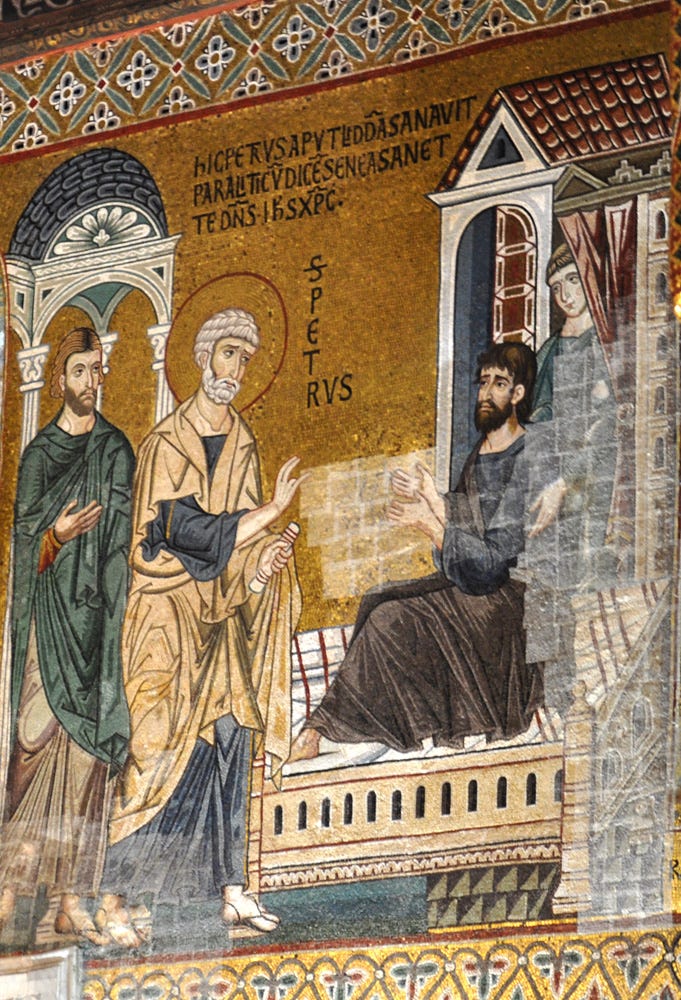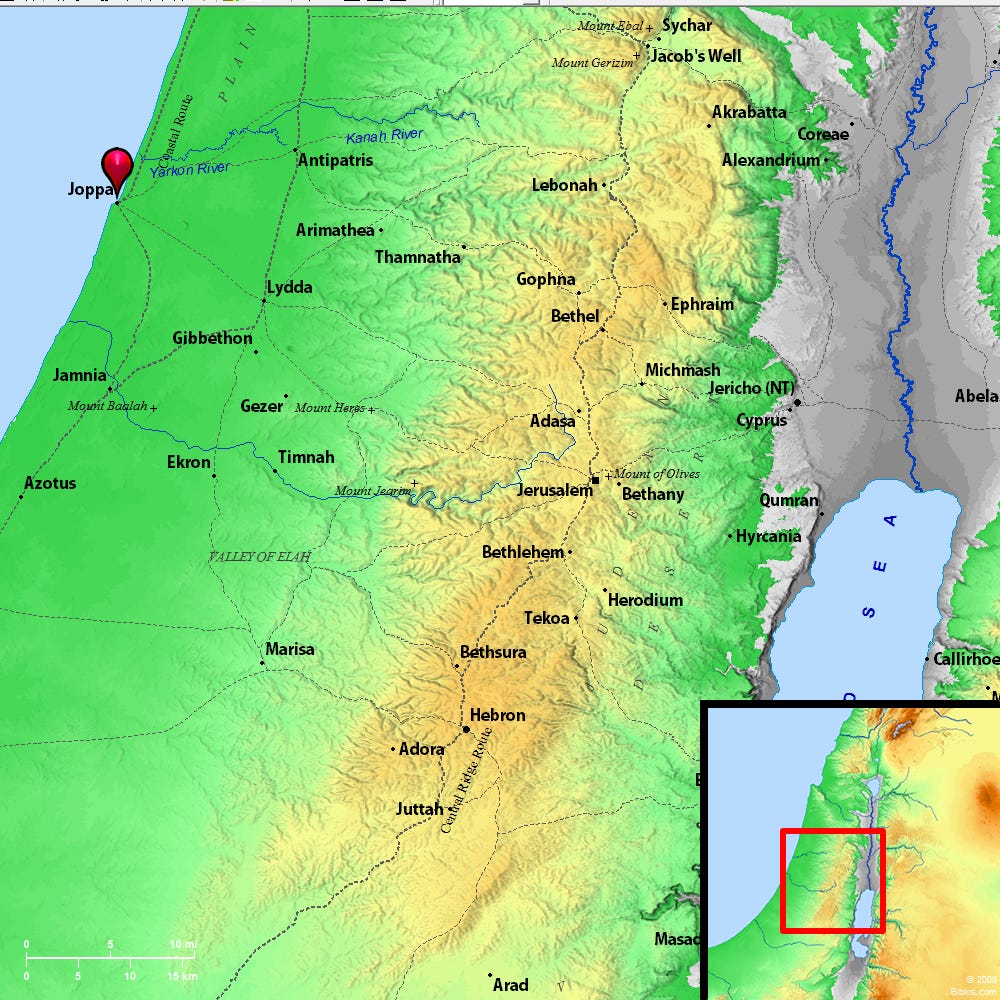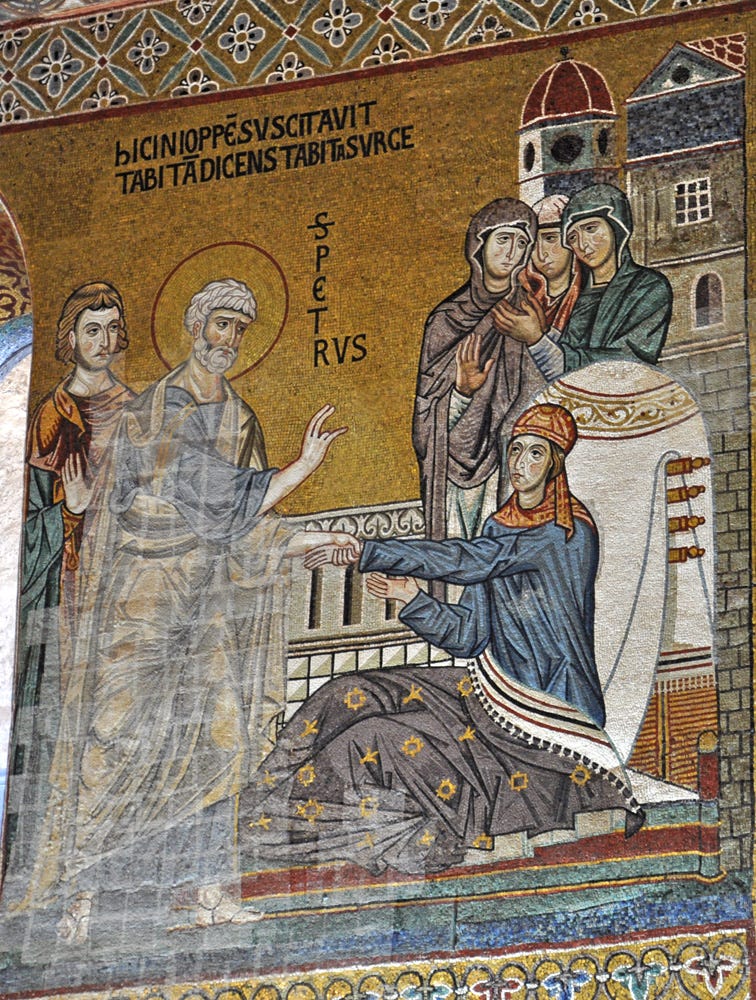A Study of Acts: Peter Travels and Performs Miracles
Acts 9:32-43; Luke 8:40-56 - Is your faith marked by ministry, humility, availability, dependency, productivity, and flexibility?
“Now as Peter was traveling through all those regions, he came down also to the saints who lived at Lydda. There he found a man named Aeneas, who had been bedridden eight years, for he was paralyzed. Peter said to him, “Aeneas, Jesus Christ heals you; get up and make your bed.” Immediately he got up. And all who lived at Lydda and Sharon saw him, and they turned to the Lord.
Now in Joppa there was a disciple named Tabitha (which translated in Greek is called Dorcas); this woman was abounding with deeds of kindness and charity which she continually did. And it happened at that time that she fell sick and died; and when they had washed her body, they laid it in an upper room. Since Lydda was near Joppa, the disciples, having heard that Peter was there, sent two men to him, imploring him, “Do not delay in coming to us.” So Peter arose and went with them. When he arrived, they brought him into the upper room; and all the widows stood beside him, weeping and showing all the tunics and garments that Dorcas used to make while she was with them. But Peter sent them all out and knelt down and prayed, and turning to the body, he said, “Tabitha, arise.” And she opened her eyes, and when she saw Peter, she sat up. And he gave her his hand and raised her up; and calling the saints and widows, he presented her alive. It became known all over Joppa, and many believed in the Lord. And Peter stayed many days in Joppa with a tanner named Simon.”
Acts 9:32-43 NASB1995
Acts 9 turns to Peter now; some commentators like Steven Ger on Precept Austin believe this is about three years after Saul flees to Tarsus or about A.D. 40. The church is undergoing rapid expansion and things are relatively peaceful from a persecution standpoint. Peter was traveling through all those regions so he did not feel tied down to staying in Jerusalem; two locations are identified in this passage and can be seen in the map below from Bible Atlas on the Bible Hub.
The map is pinned at Joppa, which is a seaport that is mentioned several times in the Bible. Joppa (now Jaffa, a suburb of Tel Aviv) is where Jonah found a ship to take him to Tarshish and away from God’s command to go to Nineveh. Joppa is where wood comes from to build the temple as noted in 2 Chronicles. Before Peter arrives in Joppa, however, he travels through Lydda, which can also be seen on this map, located a few miles southeast of Joppa. If you recall the map for the travels of Philip the Evangelist, he also came through these areas (especially Joppa) on his way to Caesarea, which is north of Joppa and not on this map.
Peter arrives in the town of Lydda, which is now called Lod; today this town, another suburb of Tel Aviv, is near Ben Gurion International airport. In Lydda Peter finds a man named Aeneas, who has been bedridden with paralysis for eight years (notice that Peter finds this man, which means he was being guided to him). He speaks to Aeneas and says “Aeneas, Jesus Christ heals you; get up and make your bed”. Aeneas is immediately healed and gets up.
Several commentators I read believed this paralyzed man was already a believer, although there is nothing substantial that supports that theory. However, Peter knows his name, so he may acquainted with some of the believers in this area. This act is apparently witnessed by many others from Lydda and the nearby village of Sharon (not on the map) and they come to believe. It is miraculous that Aeneas can now walk, but the demonstration of God’s power is better seen in the many who come to faith that day.
As usual, Substack will not allow me to put a caption on this image. This 12th century mosaic is from the same Palatine Chapel in Palermo, Sicily as the one at the top and shows Peter raising Tabitha (Dorcas) from death. These photos have a Creative Commons public license for non-commercial usage.
Peter is still in Lydda when two men approach him and request that he follow them to nearby Joppa. A woman named Tabitha (Dorcas in Greek) who was very kind and full of charity has sickened and died. Note that this woman is described as a “disciple”. This term is not used to describe any other woman in the New Testament, including Mary Magdalene, Mary (sister of Martha), Martha, Lydia or any others mentioned by name. Tabitha was obviously a devoted follower of Jesus and she demonstrated this through her continual acts of kindness. She apparently made clothing items for others and gave them away, according to this passage.
Peter is brought to the upper room where the body of Dorcas is located and asks everyone to leave. A very interesting fact is that her body is washed and laid in the upper room; she isn’t buried almost immediately, which is the normal Jewish custom of the day, but is prepared because her believing friends are anticipating a miracle. Peter likely remembers seeing this miracle that Jesus performed which takes place just after another miracle of healing:
“And as Jesus returned, the people welcomed Him, for they had all been waiting for Him. And there came a man named Jairus, and he was an official of the synagogue; and he fell at Jesus’ feet, and began to implore Him to come to his house; for he had an only daughter, about twelve years old, and she was dying.
But as He went, the crowds were pressing against Him. And a woman who had a hemorrhage for twelve years, and could not be healed by anyone, came up behind Him and touched the fringe of His cloak, and immediately her hemorrhage stopped. And Jesus said, “Who is the one who touched Me?” And while they were all denying it, Peter said, “Master, the people are crowding and pressing in on You.” But Jesus said, “Someone did touch Me, for I was aware that power had gone out of Me.” When the woman saw that she had not escaped notice, she came trembling and fell down before Him, and declared in the presence of all the people the reason why she had touched Him, and how she had been immediately healed. And He said to her, “Daughter, your faith has made you well; go in peace.”
While He was still speaking, someone *came from the house of the synagogue official, saying, “Your daughter has died; do not trouble the Teacher anymore.” But when Jesus heard this, He answered him, “Do not be afraid any longer; only believe, and she will be made well.” When He came to the house, He did not allow anyone to enter with Him, except Peter and John and James, and the girl’s father and mother. Now they were all weeping and lamenting for her; but He said, “Stop weeping, for she has not died, but is asleep.” And they began laughing at Him, knowing that she had died. He, however, took her by the hand and called, saying, “Child, arise!” And her spirit returned, and she got up immediately; and He gave orders for something to be given her to eat. Her parents were amazed; but He instructed them to tell no one what had happened.”
Luke 8:40-56 NASB1995
Peter does not want to seek glory or perform this incredible miracle in front of a crowd. He kneels and prays and turns to her body and says “Tabitha, arise!”. She opens her eyes and Peter takes her hand to help her stand up and presents her to the others. Tabitha was resuscitated, not resurrected, and she will die again, but Peter’s act saves a valuable Christian believer and her good works for the community. One could ask why this same miracle didn’t happen with Stephen, but his prayer at death was a major factor in setting up the conversion of Saul. God does not have to explain His ways or His miracles.
Many came to believe that day in Joppa. Peter decides to stay for “many days” in Joppa; interestingly, he stays at the home of Simon the Tanner, who is probably a Gentile. Obviously, Peter is shedding many of the constraints and rules of his Jewish upbringing; tanners were considered unclean and had to live outside town limits, according to Jewish customs.
To end this, I want to share a commentary from Precept Austin by Dr. David Jeremiah that I thought was superb:
Introduction: The violinist Paganini stood before a packed house and played a number of difficult pieces, but one of the strings on his violin broke. He improvised on three strings, but a second string broke. Near the end of the concerto, a third snapped! Amazingly, he finished the piece on one string. The audience stood and applauded till all hands were numb. In the same way, think of what God can do with one man or one woman whom He blesses and uses.
1. A Life Marked by Ministry (Acts 9:32–33). God uses a life marked by ministry. Peter was a go-getter, going everywhere with the gospel. God seems to use busy people. It seems like every biography I read tells the story of someone who’s on the move, doing the work God has assigned. We find God’s will by being about the will He’s already revealed to us.
2. A Life Marked by Humility (Acts 9:34–35). As Peter itinerated, he came to Lydda where he found a certain man named Aeneas who had been bedridden for years. Peter told him, “Jesus the Christ heals you. Arise and make your bed.” Peter approached Aeneas, not to seek glory for himself, but for the Lord. God will not use those who are not humble in His sight. If you want to be impressed with yourself, God won’t bless you; but if you’ll allow God to work in your life and if you’ll give Him the glory, He will honor you. Peter wasn’t the healer, just the instrument. This was a one-person miracle, but its impact affected the entire city and area. Peter dealt with one man, but many turned to the Lord. Was Peter a God-blessed minister? I guess he was!
3. A Life Marked by Availability (Acts 9:36–39). From the restoration of Aeneas, Peter moved to the resurrection of Dorcas. The second miracle was a result of being available for the first one. If Peter hadn’t been in Lydda, they wouldn’t have come to get him. Walking with the Lord is an adventure. We start one place, and one opportunity leads to another. And Peter was willing to go. He didn’t have any roots that would keep him from being where God wanted him to be. This woman (Tabitha is her Aramaic name, and Dorcas is her Greek name; both words mean gazelle) was apparently a very graceful woman. The Bible calls her a “certain disciple.” She was full of good works and charitable deeds. Verse 39 says she sewed tunics and garments for those around her. She was a model of the verse saying we are His workmanship, created in Christ Jesus for good works” (Eph. 2:10). When Dorcas died, her friends washed her body, laid her in an upper room, and went for Peter.
4. A Life Marked by Dependency (Acts 9:40–41). Peter needed something in that hour he couldn’t provide, so he knelt and prayed. We need a spirit of dependency: “Lord, if You don’t do something here, nothing’s going to happen.” When Peter finished praying, he turned to Dorcas, and said, “Arise.” She opened her eyes and sat up. Imagine the joy in the church that day.
5. A Life Marked by Productivity (Acts 9:42). The life God blesses is marked by productivity because everyone in Joppa heard of this, and as news spread more progress was recorded for the kingdom.
6. A Life Marked by Flexibility (Acts 9:43). This verse is about Peter’s remaining among the Gentiles. Peter has yet to deal with the idea that Gentiles are included in the church. He’d grown up with traditional Jewish prejudices, so when he dwelt with Simon the tanner—oh my goodness, tanners dealt with dead bodies. To a Jew, a tanner was an outcast from synagogue and society. Now everyday Peter woke up to see stinking animal skins hanging through the house. God was teaching Peter that the legalistic life was over, and now in Christ, there is neither Jew nor Gentile.
Conclusion: God blesses a life that’s marked by ministry. What are you doing to serve God? A life marked by humility. Do you give the glory to Christ for what He’s doing in your life? A life marked by availability. Are you willing to go to Joppa? A life marked by dependency. When you do something for God, do you kneel and pray? A life marked by productivity. When you serve the Lord, something’s going to happen. And a life marked by flexibility. Are you willing to serve God no matter the circumstances?
The circumstances of this last passage in Acts 9 are a perfect set-up for the amazing events that we will hear about in Acts 10. My next devotional examines the first part of that chapter, Acts 10:1-8, in which a Gentile named Cornelius in Caesarea has a vision.
Heaven on Wheels Daily Prayer:
Dear Lord - Help me to have a life of faith marked by ministry, humility, availability, dependency, productivity, and flexibility! Amen!
Scripture quotations taken from the (NASB®) New American Standard Bible®, Copyright © 1960, 1971, 1977, 1995 by The Lockman Foundation. Used by permission. All rights reserved. lockman.org.
Precept Austin was accessed on 10/05/2024 to review commentary for Acts 9:32-43.





